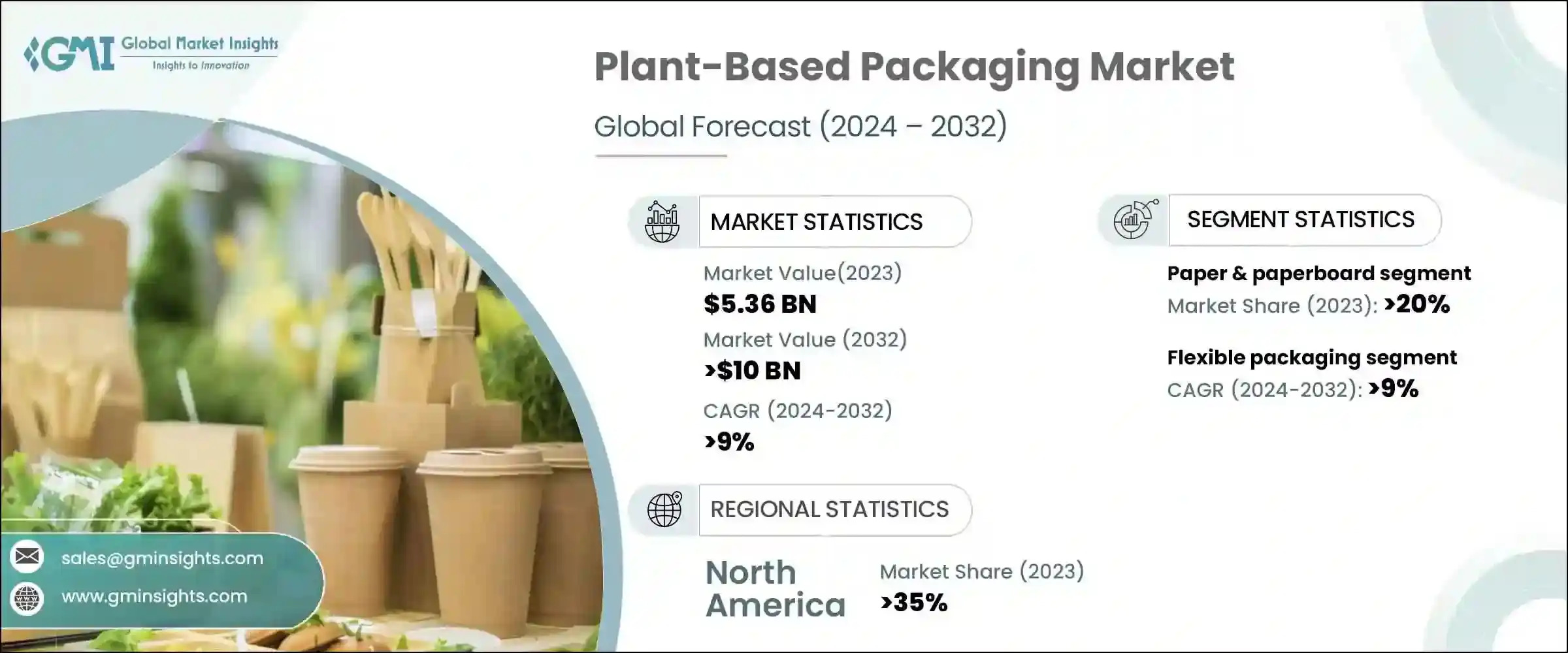Selbyville, Delaware , Nov. 14, 2024 (GLOBE NEWSWIRE) -- Plant-Based Packaging Market was valued at USD 5.36 billion in 2023 and is projected to be worth USD 10 billion by the end of 2032, as per a recent study by Global Market Insights Inc.
The rise in environmental concerns and the growing awareness around climate change have fueled a significant shift in consumer preferences towards sustainable products. Many shoppers now actively choose brands that embrace eco-friendly practices, including the use of plant-based packaging. As a result, the market is experiencing strong growth, with increasing demand for alternatives to traditional plastic packaging. According to the U.S. Environmental Protection Agency (EPA), there has been a notable rise in consumers seeking out products that incorporate plant-based materials.
Request for a sample of this research report @ https://www.gminsights.com/request-sample/detail/11603

Governments around the world are enforcing stricter regulations to combat plastic waste, including bans on single-use plastics and incentives for companies to adopt sustainable solutions. These policies are prompting businesses to shift toward plant-based packaging to comply with environmental standards. By meeting these regulatory requirements, companies not only avoid penalties but also position themselves as leaders in sustainability, which is increasingly appealing to environmentally conscious consumers.
Recent advancements in material science have improved the performance and affordability of plant-based packaging. Innovations in bioplastics and other plant-based materials now offer better heat resistance, durability, and barrier properties, making them more competitive with traditional packaging options. These technological improvements are driving further adoption of plant-based packaging across multiple industries.
The plant-based packaging market is segmented by material type, with categories including paper & paperboard, bioplastics, bagasse, palm leaves, bamboo, and others. In 2023, the paper & paperboard segment held the largest market share at over 20%, valued for its sustainability and versatility. This segment continues to evolve, with innovations focused on improving strength, moisture resistance, and other functional properties, increasing its appeal as a sustainable alternative to plastics.
The plant-based packaging market is also divided by product type into rigid and flexible packaging, with the flexible packaging segment expected to grow at a CAGR of over 9%. Flexible packaging, which includes pouches and wraps, is highly valued for its versatility and adaptability, making it suitable for a wide range of products.
Make an inquiry for purchasing this report @ https://www.gminsights.com/inquiry-before-buying/11603
In 2023, North America led the market with over 35% share, driven by strong regulations and high consumer demand for sustainable products. The region is expected to maintain its dominance throughout the forecast period.
Plant-Based Packaging Market Players
Companies including Amcor, Mondi Group, Sealed Air, Tetra Pak, Stora Enso, Evergreen Packaging are some firms working in plant-based packaging industry.
The plant-based packaging market research report includes in-depth coverage of the industry with estimates & forecast in terms of revenue (USD million) from 2021 to 2032, for the following segments:
Market, By Material Type
- Bioplastics
- Paper & paperboard
- Bagasse
- Bamboo
- Palm leaves
- Others
Market, By Product Type
- Rigid packaging
- Flexible packaging
Market, By End Use Industry
- Food & beverages
- Pharmaceuticals
- Personal care & cosmetics
- Industrial
- Retail & E-commerce
- Others
About Global Market Insights
Global Market Insights Inc., headquartered in Delaware, U.S., is a global market research and consulting service provider, offering syndicated and custom research reports along with growth consulting services. Our business intelligence and industry research reports offer clients with penetrative insights and actionable market data specially designed and presented to aid strategic decision making. These exhaustive reports are designed via a proprietary research methodology and are available for key industries such as chemicals, advanced materials, technology, renewable energy, and biotechnology.
